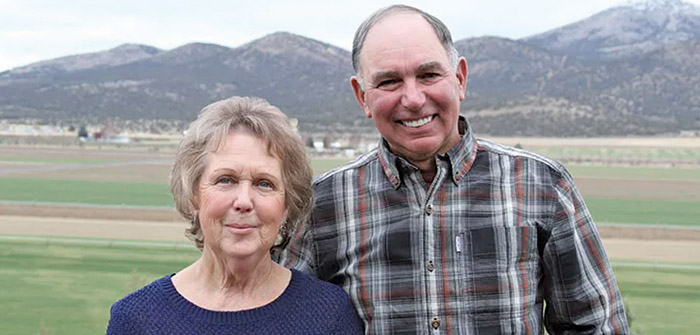(The family-owned-and-operated farm was started by Sharon and Butch McPheeters in 1979 | Photo courtesy of Diggers Magazine)
In 1979 — when Apollo 11 lifted off from Cape Kennedy for the first human landing on the moon, and Sony released the Walkman because its co-founder wanted to be able to listen to music on long flights — Butch and Sharon McPheeters, who had been sweethearts at Redmond High School, started their own business producing and selling sod: McPheeters Turf.
Twenty-five years later, this second-generation, family-owned-and-operated farm — having added a nursery in 1988 — offers a large variety and quantity of trees, shrubs, and plants that thrive in Central Oregon’s high-desert climate.
Among their products are field-grown crops that have included wheat, peppermint, grass seed, and potatoes, as well as trees like aspen, maple, birch, ponderosa pine, Colorado and Norway spruce, crabapples, and Frasier fir, McPheeters Turf also grows some items in containers. These have consisted of barberries, spirea, ornamental grasses and flowering trees, rhododendrons, coralberry, serviceberry and willows, among others.
According to Sharon, “Our goal is to grow products that are already adapted to our changing climate. On the nursery side, for example, we generally avoid growing the lush, flowering plants favored in the Willamette Valley. Here in Central Oregon, those plants tend not to survive winter snows and summer heat — and the appetites of deer.”
Proving advantageous in that regard is the Culver location of McPheeters Turf. “We’re on the east side of the Cascades with its dry climate,” said McPheeters, “unlike most Oregon nursery growers on the west side, which is influenced by the proximity of the Pacific Ocean, and tends to have mild winters and frequent snowfall — at least historically,”
As with most successful family-owned businesses, each member has a specific area of responsibility. Butch deals primarily with the turf side; Sharon works in the office and interacts with customers; and daughter Brenda oversees container production and nursery sales; while her husband Jason Potampa is in charge of field-grown trees and crops. “They’re all people who love doing what they’re doing,” said Butch McPheeters, “and Sharon and I feel very proud that Brenda and Jason are such an integral part of the business.”
“We wouldn’t be doing this if we didn’t have family to discuss things with,” added Sharon. “Even if we don’t always agree — Butch and I argue on the side of ‘we’ve been doing it this way for 40 years,’ while the younger generation has new ideas — our relationships are positive, which you have to have. Everyone has a voice, and collectively we decide what’s most reasonable.” It all adds up to the company’s claim that “Our grass is always greener, and our service always shines.”
Jason Potampa identified the biggest problem McPheeters Turf faces: irrigation. “It’s been five years now that, due largely to Central Oregon’s drought, we’ve been short of water because the amount we have been allocated has gone down so much. This affects how much we can grow, and I would estimate that in any given year, as much as 40-50 percent of our property has sat idle.”
Labor has been another major issue, as — to use Sharon McPheeter’s words — “it’s hard to get people to work outside in all kinds of weather.” “We’re using more mechanical and automatic agricultural equipment to help compensate for the labor shortage,” said Potampa, “and now, for example, have two automatic stackers and a palette stacker. We’ve also made changes to our irrigation system to eliminate hard line that requires people to move it. We’re trying to do away with the need for labor, as we can.”
Potampa said that “It’s impossible to tell the future of farming. It’s a little up in the air — and absolutely dependent on irrigation.” And irrigation, in turn, is affected by a variety of factors ranging from concern for endangered species, to the release of water from reservoirs during the winter months while farmers and ranchers “are in the midst of storing it. We haven’t been able to build up as much as we’d like,” he noted.
“And of course,” added Potampa, “there’s the weather, which we don’t control, as well as other aspects like people’s changing attitudes toward landscaping. As a result, our crops ebb and flow, and we adapt and adjust.”
Potampa, who worked on cattle ranches while growing up, and later obtained a seminary degree, has now “been involved in this business for the past 22 years. It keeps me out of trouble,” he said.
Butch and Sharon are equally modest. “People ask us why we’re not retired,” Butch said. “It’s just a pleasure to get up every morning and see what the challenges of the day are going to be.” Added Sharon, “He always says he’s not done playing in the dirt yet.”





